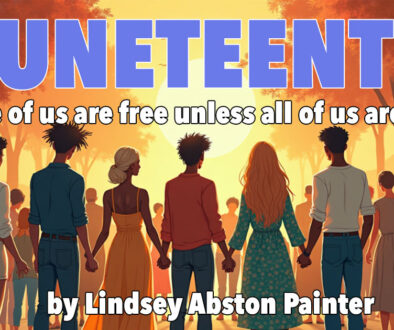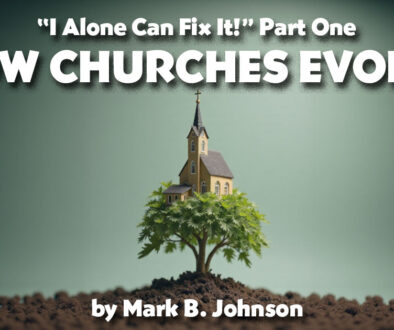Is Church Membership Still Important?
by Loren Seibold | 30 May 2024 |
There is an inherent problem with organized religion—specifically, corporate religion, the sort of organization that we Adventists specialize in.
Yes, it provides valuable things like payrolls and pension plans and insurance.
On the other hand, it has a tendency to lead us into unfortunate compromises.
The leaders of our denomination are, like the Pharisees, really quite good people. They wouldn’t be cruel to children, or steal money, or take advantage of women, or lie wholesale. (That a few have is the exception that shows that most don’t.) Most of them are compassionate people. I know not a single one who is by nature hateful or mean.
But put them together as a group, under a logo and name, with a payroll and buildings and employees and retirement plans and a reputation that they feel they must protect; give them authority and a microphone; and the very same group of good men (still, mostly men, still largely good) turn capable of such compromised courage as to end up doing evil whether they think they are or not.
It is the nature of organizations: shared among all of us, our goodness dilutes down to pusillanimity.
And the bigger we get, the less good we seem to be.
Safe membership?
Over and over again we have been told that the overweening Seventh-day Adventist Church bureaucracy is kept in check by the policy that the membership resides solely in the local congregation. I’ve reassured people with this: “Don’t worry,” I say, “your membership is safe in your congregation, no matter who you are, or what you believe—or don’t.”
That is something I’d probably not say anymore. It’s not always true. At least one conference has shown that they’ll go to extreme lengths to circumvent that policy.
So how did this happen?
The background
At some point it got written into the policies and bylaws that,
- The denomination (specifically, the local conference) should own the church’s building.
- A congregation can be disbanded if it is “in rebellion.”
Suppose a congregation dwindles down to one man. Should that man be able to sell the building and pocket the proceeds? Or 51% of a congregation, exercising democracy, votes that they’d rather be Presbyterians. Do they get to keep the church building and kick out the remaining 49%?
I’ve no argument with the principle.
Rocky Mountain Conference
But recently the Rocky Mountain Conference threatened to disband a congregation to stop it from accepting a member they wanted to have in their church.
One member. Just one.
Should a congregation be closed because it accepts one member that the conference office doesn’t like?
Closing down a church “in rebellion” has rarely been done. Off the top of my head I can think of only one other case in the North American Division: Burbank, California, over 50 years ago. If you read the history of this, you will find that there were months of negotiations and many interim steps before the Southern California Conference went to the nuclear option.
Rocky Mountain threatened the nuclear option right away.
Over one member.
“You can worship with us. But you can’t be a member.”
In the ensuing conversation, one of the things I heard was, “No one stopped this married gay man from coming to church. He just can’t be a member.”
Back in the 1600s, the Puritans of New England, if they wanted to be church members, were required to present evidence of a conversion experience. Besides demonstrating an understanding of doctrine and having a reputation for probity, they had to deliver a narrative of how they came to be convinced that they were saved, and show evidence by preaching and prophesying. Each account was judged by the congregation.
This came about during a period of religious revival. That expression of faith didn’t age well. The next generation wanted to be church members, but having not gone through the emotional enthusiasm of their elders, they weren’t preaching and prophesying.
So the elders came up with an alternative: the “halfway covenant.” These second-, third-, and fourth-generation people could be members, but without the privileges of full membership. They could attend church, but they couldn’t vote on church matters, or hold church offices.
By the end of the 1600s, halfway members outnumbered full members four to one in many congregations.
This appears to be what people mean when they say, “You can fellowship with the church, but not be a member.”
OK, so, I’m thinking this over…
- Were I not a member, I wouldn’t ever have to serve on a nominating committee or church board or attend business meetings. (There’s not a church business meeting I’ve ever been to that I wouldn’t have traded for a root canal.)
- I couldn’t be pressured to take church jobs, especially since some of them are nothing but toil and trouble.
- Presumably no one could upbraid me for not paying enough tithe, or not showing up at church every week.
- I could believe or disbelieve any of the fundamental beliefs, and no one could criticize me for it—because I’m not a member.
- The decisions that the General Conference makes, like refusing to ordain women or excluding LGBTQ people? I can strongly disagree. What’s more, I don’t have to feel embarrassed about these supposedly democratic decisions—because I’m not a member.
- And if the music and the pastor’s sermon are inspiring, I can still be uplifted, and presumably respond accordingly—including with my tithes and offerings, which I’m pretty confident they wouldn’t turn down.
So, what, exactly, am I missing out on by not being an official member?
I think the brethren had better rethink this. If the word gets out that it’s an option to attend church and not have to attend any governance meetings, never be criticized for a job you’re doing as a volunteer, nor answer for how much you’re giving (or not) in the offering plate, or have to pretend to believe things you don’t—what would most people choose? Which sounds more conducive to an atmosphere of worship and spiritual re-creation?
In short: what if people start to think that being an official Seventh-day Adventist church member isn’t that much of a privilege?
One commenter to the original news article agreed: “I’d think they’d be thrilled that anyone still wants to be a church member!”
What it’s really about
It should be clear that the Rocky Mountain Conference story wasn’t about LGBTQ people. There is no need to make the argument again that the sorts of people covered in the LGBTQ acronym are born the way they are, and should be respected for what they are. To quote James Baldwin,
Everybody’s journey is individual. If you fall in love with a boy, you fall in love with a boy. The fact that many Americans consider it a disease says more about them than it does about homosexuality.
No, this is about good people in a church bureaucracy so fearful of being criticized that they’re willing to break their own policies, and defend doing so in God’s—or at least the denomination’s—name.
And it’s now clear your church membership isn’t safe from those in church leadership, either.
Most of us have enough places in our life where people have authority over us, without having a bunch of people in an office somewhere controlling us in our place of worship, too.
Being a member once meant confessing to being part of a group whose beliefs and practices you valued. And there are still many of those! But times change, and people change. Women as clergy and LGBTQ people as fellow church members are accepted by many of us. The denomination lags the culture, and our church leadership not only resists change, but keeps trying to pull us back into the 1800s.
As a pastor, it makes me sad when someone says, “I can’t conscientiously be a member of this denomination anymore.” But as an observer of our denomination’s inability to mature, I understand.
And the brethren (still, almost exclusively brethren, still only a tiny smattering of sisters) have no one to blame but themselves. They’ve let the denomination get stale and stuck. They’ll call it “the shaking,” and blame lukewarm members.
But they’re the ones shaking people out. They are yanking out the weeds, when they should wait for the harvest.
Perhaps that’s what Jesus was thinking about when he said,
Many will come from the east and the west, and will take their places at the feast with Abraham, Isaac and Jacob in the kingdom of heaven. But the subjects of the kingdom will be thrown outside.…
 Loren Seibold is a retired pastor, and Executive Editor of Adventist Today.
Loren Seibold is a retired pastor, and Executive Editor of Adventist Today.




